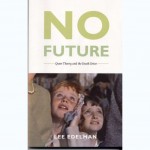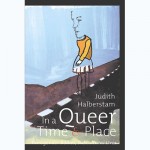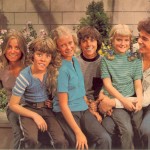My academic background is in religion. Before getting a PhD in Women’s Studies at Emory University, I got a MA in Theology, Ethics and Culture at the School of Theology at Claremont and a BA in Religion from Gustavus Adolphus College. While my work has shifted away from religion/religious ethics in recent years, my early training and interest in religion has persisted and managed to remain a big influence on my thinking.
In the past few years I have felt increasingly compelled to bring that early training back to the forefront in order to give some serious attention to the connections between ethics, religion, queer theory, feminism and troublemaking. And yes, contrary to popular opinion, there are connections (and not just negative ones!). You can be feminist and ethical! You can believe in a queer God! You can even make trouble and proudly label it religious activity! What, don’t believe me? Here are just a few sources that support my claims:
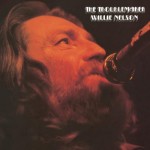 THE TROUBLEMAKER
THE TROUBLEMAKER
I came across this song when I was randomly googling troublemaking. I’m Learning to Share focuses on Della Reese’s version of it from 1971, but Willie Nelson also sang it on his gospel album of the same name.
Warning Spoiler Alert: The song is all about a troublemaker who had long hair, no job and refused to join the army. He and his friend were rebels who went from town to town stirring up trouble. He was eventually arrested, tried and given the death penalty. At the end of the song, he is hung from a cross. Whoah…What a twist. Jesus as a troublemaker? Okay, the song is a little cheesy, but the connection between troublemaking and Jesus-as-prophet is pretty cool.
This connection is not limited to popular music and the likes of hippy-loving Willie Nelson, however. Cornel West writes about deep democracy, the Socratic tradition and the prophets (prophetic pragmatism) in Democracy Matters. Incidentally, when I presented on Judith Butler and the virtue of troublemaking at the National Women’s Studies Association conference in 2007, my dad (a religion and ethics scholar) suggested that I explore the prophet-troublemaker connection. Thanks AEP!
QUEER CHRIST: TRANSFORMING ANGER INTO HOPE
Reverend Dr. Carter Heyward gave a sermon (I originally linked to it, but the link doesn’t work anymore–as of April 29, 2012) in 2004 at the Episcopal Divinity School. Very cool. Here is her definition of queer. A queer is someone who has an “irrepressible interest in making connections between justice struggles and making these connections public. Not hiding [their] convictions under a barrel. Not remaining silent when everyone around [them] would be more comfortable if they were…” and who does so with compassion and love. For Heyward, being queer is being confrontational and compassionate. It is to embody apparent (but only apparent) contradictions, to be angry (about injustice) and yet to love all of humanity at the same time. For Heyward, to be queer in this way is to embody Christ–who holds together qualities that only appear to be contradictions (but aren’t–and that simultaneous embracing of seemingly contradictory qualities is what makes Christ queer).
note: Since this sermon doesn’t seem to be available online anymore, here’s a passage that I particularly liked:
What makes her, my mother so queer is not simply that she is supportive of her lesbian daughter and my friends and communities; and not simply that she is at strong odds with the prevailing political culture in both the world and church in which she has grown old. What makes my mother queer is her irrepressible interest in making connections among justice struggles and making these connections public! Not hiding her convictions under a barrel. Not remaining silent when everyone around her would be more comfortable if she were sometimes a little less in their face about Bush, the war, and gay marriage. At the same time, you will never meet a gentler, kinder, more compassionate soul than my mother Mary Ann Carter Heyward.
Is she in your face about injustice? Yes.
Is she open to you and eager to know what really makes you tick? Yes.
Is she angry about the injustices we join in and perpetuate? Yes.
Is she compassionate and forgiving toward everyone she has met who has hurt her or done her wrong? Yes.
The queerest thing of all about my mother is that she is such a bundle of apparent contradictions. She is confrontational and compassionate, angry and gentle, representing for me One through whom we meet God face to face. There are many people, including many right here in this chapel, who embody Christ for me in stunning ways. But there is no one through whom I catch stronger intimations and glimpses of the Wisdom of God, Christ herself, than my own queer mother.
This is because the most dynamic dimension of Queerness – and Christ – is the holding together of qualities that only appear to be contradictions, qualities that are not in fact contradictory or oppositional, qualities that taken together are, well, simply “queer.” Each brings out something in the other, revealing it more fully for what it is: humanity and divinity, anger and compassion, the struggle for life and the letting go of it, a capacity to wrestle fiercely against the enemies of justice and to love them concretely, which means trying to do them no harm, trying not to humiliate them, respecting them as brothers and sisters, whether or not they recognize us. Like the humanity and divinity we meet in Jesus and — through him as our spiritual lens — in one another, we also can experience anger and compassion, anger and gentleness, anger and forgiveness, anger and hope not as contradictory feelings but rather as mutually interactive dynamics of human being and divine being that work together in us and make us whole.
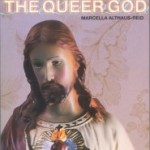 THE QUEER GOD
THE QUEER GOD
Marcella Althaus-Reid wrote this book in 2003. I wanted to use it, or at least parts of it, in my Feminist and Queer Explorations in Troublemaking class this past spring, but I couldn’t find any room for it. I am still trying to figure how to squeeze in a chapter or two in Queering Theory this fall. Is this book accessible for non-theology, non-religion students? I am not sure. I need to read it more closely to make sure. Here is part of the blurb on the back of the book:
The Queer God introduces a new theology from the margins of sexual deviance and economic exclusion. …Inspired by the transgressive spaces of Latin American spirituality, where the experiences of slum children merge with Queer interpretations of grace and holiness, The Queer God seeks to liberate god from the closet of traditional Christian thought, and to embrace God’s part in the lives of gays, lesbians and the poor.
The first chapter of this book that I want to read is “Chapter 8. Demonology: Embodying Rebellious Spirits.” Seems like I might find some interesting connections with troublemaking here.
 BODILY CITATIONS: RELIGION AND JUDITH BUTLER
BODILY CITATIONS: RELIGION AND JUDITH BUTLER
This collection edited by Ellen T. Armour and Susan M. St.Ville was published in 2006 and offers a wide range of essays by scholars in biblical studies, ethics, theology and ritual studies on the religious significance of Judith Butler’s work. I am particularly interested in Claudia Schippert’s essay, “Turning on/To Ethics.” Schippert wrote another essay (in 1998) that I have just started entitled, “Too Much Trouble? Negotiating Feminist and Queer Approaches to Religion.” I hope to write more on this essay later. [In the process of looking up links for this edited collection, I found this queer theology bibliography. Must check some of these sources out later.]

